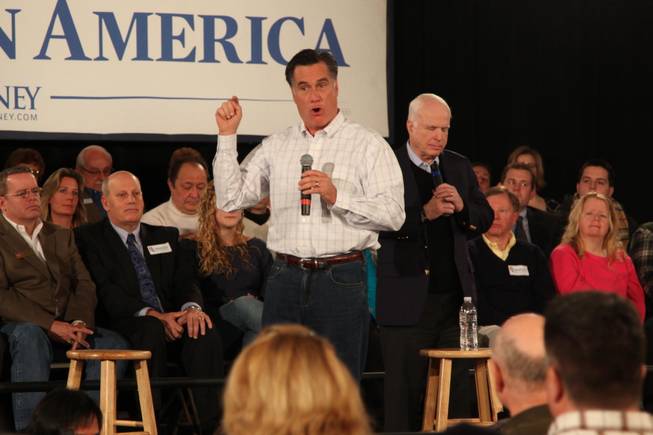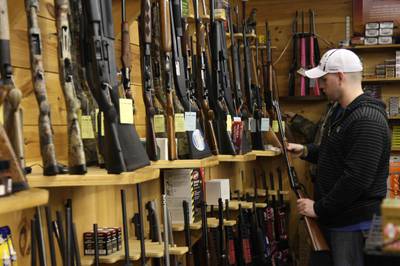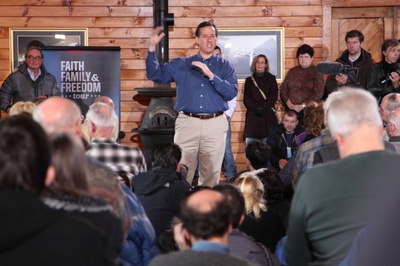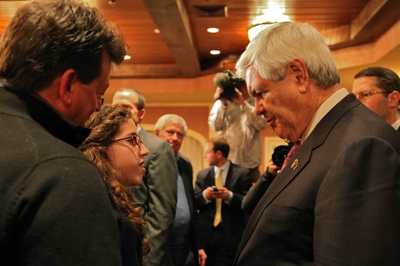
KAROUN DEMIRJIAN
Republican presidential candidate Mitt Romney, joined by 2008 GOP nominee Sen. John McCain, speaks to supporters at a town-hall meeting in the gymnasium of the Boys and Girls Club in Salem, N.H., on Jan. 5, 2012.
Saturday, Jan. 7, 2012 | 2 a.m.
Sun Topics
Local reaction to Iowa caucus
KSNV coverage of the local reaction to the results of the Iowa caucus, Jan. 3, 2012.
When it comes to politics, Nevada sees itself a freethinking, independent state like no other. But across the country, another state shares its libertarian leanings — so much so that New Hampshire’s Republican presidential primary is a potential harbinger of what’s to come in the Silver State’s caucuses.
New Hampshire is still a sore subject for some Nevadans when it comes to the 2012 election: The Granite State’s secretary of state, William Gardner, insisted Nevada move its caucuses to a later date to accommodate a quirk in New Hampshire state law requiring a seven-day cushion before and after the state’s primary.
But rivalries aside, when New Hampshire votes Tuesday it could provide the best indication of how the Republican presidential field will fare with the Nevada electorate on Feb. 4, and it’s not just the “Live Free or Die” motto that defines New Hampshire’s self-determining spirit.
Consider the following:
Like Nevada, New Hampshire is a state divided between a high-population urban center in the south (Manchester) and a large, rural, and geographically isolated north (New Hampshire has about half the population of Nevada over a much smaller area).
New Hampshire even outdoes Nevada when it comes to keeping the government out of personal finance: There is no income tax or sales tax there.
But political similarities are what matter most in this exercise.
And New Hampshire, like Nevada, isn’t dominated by the sort of social conservatives who largely determine the outcome of the Iowa caucuses. The state actually has a larger proportion of voters who don’t register as either Republican or Democrat than Nevada (Independents can choose to vote in one or the other party’s primaries). And while Nevada was the state that gave Mitt Romney his strongest showing of 2008, he’s been an even stronger front-runner in New Hampshire this cycle: Before Santorum’s surge, Romney was polling at 43 percent in New Hampshire, while pulling 33 percent in Nevada.
That means, in this season of political uncertainty, that what happens in New Hampshire could play out to even more dramatic effect in Nevada.
Two polls have been conducted in Nevada this fall, a season in which the GOP field has resembled a game of Whac-A-Mole with candidates quickly surging and then getting slapped down. One was in mid-October when Herman Cain — who is no longer in the race — commanded 27 percent of the Nevada vote (second to Romney); the other, in mid-December, placed Newt Gingrich at 29 percent at the height of his surge, behind Romney’s 33 percent.
A lot has happened since then: Romney’s chief Republican challengers are now Rick Santorum, the erstwhile senator from Pennsylvania, and libertarian rabble-rouser Ron Paul, a congressman from Texas.
Santorum and Paul were in New Hampshire last week trying to build on the momentum from their finishes in Iowa — Romney only beat Santorum by eight votes in a squeaker that is now in doubt. And while so far they have only chipped away at Romney’s base, their combined support is growing. Paul is holding steady in the high teens, while Santorum has almost quadrupled his poll numbers in the past week, going from 3 to 11 percent. As Santorum tours the state, people appear to be hopping aboard his newly revved-up bandwagon.
Still, electability has been one of Romney’s strongest selling points, one that his supporters touted at campaign appearances.
“He turned around the Olympics. He has business acumen that I don’t think any of the other candidates have,” said Ellen Thibodeau, of Windham, N.H., a longtime Romney supporter. “I really like him ... I think he has a vision for the country.”
“I think we have some major issues in this country, namely the economy, that need to be fixed, and by far (Romney)’s the best one of all the Republican candidates to do that,” said Ed Lewis of Salem, N.H., who recently settled on voting for Romney. “Mitt is the one who can do the best job, and is most electable.”
But his opponents are trying to convince voters otherwise.
In a Thursday town hall in New Hampshire’s Lakes region, a strongly conservative area, Gingrich called himself “the only candidate who understands how to design national campaigns and understands how to implement them once elected.”
Meanwhile, Santorum has been counseling people at his town halls that Romney’s sort of electability — though he won’t mention the front-runner by name — isn’t worth the win.
“Don’t settle for a Pyrrhic victory. Don’t settle for someone who can win but can’t do, won’t do and has no track record of doing,” he told an overflow crowd in Brentwood, N.H., the day after the Iowa caucuses.
The candidates make their pitches in very different ways.
Romney’s campaign exudes the confidence of a presumptive presidential operation. He travels with a portable black-box set that is erected to camera-ready perfection (even if the microphones don’t always work) in every gym where he holds a town hall. During forums, Romney and John McCain, the GOP’s 2008 nominee who has endorsed him, sit in a boxing-ring style set surrounded by constituents and press. They take several questions, but rarely engage in colloquy. Everyone usually has seats.
Santorum, on the other hand, takes to the campaign trail like a popular high schoolteacher. He stands in the front of the room, which never has enough chairs for the throngs of curious voters, taking questions and giving lengthy and detailed answers, sometimes to the point of rambling. He’ll toss questions back to the audience too, asking for shows of hands (“This is called participatory democracy, you guys are good at this,” he told a gathering in Northfield, N.H.), and sometimes even getting into fights, as he did with one college student in Concord, N.H., over gay marriage.
The style is winning over voters.
“He makes an awful lot of sense,” said Geraldine Iliff, of Franklin, N.H., after hearing Santorum speak in a forum at the Merrimack Valley Railroad Co. in Northfield. “I’m looking for a conservative ... he may have my vote.”
“He did a good job being detailed and specific. I appreciated his back story on things, and he explained things well. That was a turning point for me,” said Heather Javalgi of Belmont, N.H. “He definitely did a good job today, enough to have me back him.”
If Santorum is the high schoolteacher, Gingrich, who is polling fourth, is the college professor, lecturing from his podium for more than half of his town hall forums, and opting to greet a long receiving line of guests at the end instead of entertaining a barrage of questions during the forum.
“I think (Newt) probably is the better candidate to debate Obama,” Ken Rafferty of Laconia, N.H., said after hearing Gingrich speak. “I just don’t think Santorum has the clout.”
Paul, the sturdy second-place candidate, has kept the most mysterious schedule, staying off the campaign trail until Friday afternoon, when he burst out with a short rock-star style appearance before a crowd of Paul-faithful that only an airplane hangar could hold. He took no questions, but like any rock star knows, you win them over by leaving them wanting more.
“We just wanted to get to see him in person,” said Carole Yemma, a retiree from East Kingston, N.H. “It kind of clinched it.”
“He wants to do some drastic changes that are needed,” said Yemma’s husband, Donald, who added that Jon Huntsman is “my second choice. I just think he’s solid.”
Huntsman, who skipped Iowa, has been campaigning in New Hampshire more vigorously than anyone else in the field, but is still polling near the back of the pack.
How the ebb and flow of the Republican field will be reflected in the ultimate outcome in New Hampshire isn’t clear.
Romney, who’s well-known here from his time as governor of Massachusetts, is expected to win. But the $64,000 question is by how much, and whether it will be a convincing enough victory to carry him through the less-friendly terrain of South Carolina, and then Florida, before the contests come West.
After a Romney rally in Salem, a campaign volunteer who plans to travel to several states on behalf of the candidate, lamented that Nevada wasn’t the next to cast ballots, as originally planned. Were these political bookends — New Hampshire and Nevada — to vote back to back it would remove any question that Romney is bound to be the party’s nominee, he said.
“The New Hampshire endorsement is going to be wasted ... until we get to Nevada,” said the volunteer, who only gave his first name, Jeff. “I wish you guys were still having the primary on Saturday, I was really looking forward to that nice momentum ... it would have been great.”
Whether the Silver State’s caucuses change the course of the race or simply continue an inevitable trend depends on what happens in the coming days, and how New Hampshire votes once it finally makes up its mind.
“I was torn between Gingrich and Santorum before I came in. And I am now considering Romney as well,” said Deborah Anderson of Salem, N.H., after a Romney town hall Thursday. “I wish you could take a little from each candidate and put them all together into one ... Romney and Santorum, put ’em together ... why not make that a ticket?”




Join the Discussion:
Check this out for a full explanation of our conversion to the LiveFyre commenting system and instructions on how to sign up for an account.
Full comments policy